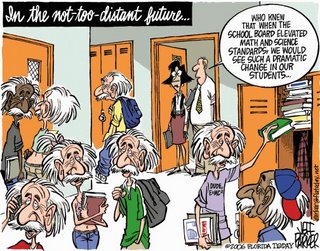More "Wrong Thinking" from Jim Wooten on Education Standards and Testing
 I've given Jim "The Tool" Wooten some slack lately. I think part of the reason is due to the new format of his "Right Thinking" work in the AJC where comments are provided. The comments are often as dreadful as Jim's positions, with little if any southern hospitality shown by some posters, yet maybe that is Jim's role at the AJC. His work seems to attract a rather bizarre mix. I've long found his reasoning and writing difficult to follow, yet when it comes to his shilling the right's ideas on "education" he often demonstrates an especially horrible lack of understanding.
I've given Jim "The Tool" Wooten some slack lately. I think part of the reason is due to the new format of his "Right Thinking" work in the AJC where comments are provided. The comments are often as dreadful as Jim's positions, with little if any southern hospitality shown by some posters, yet maybe that is Jim's role at the AJC. His work seems to attract a rather bizarre mix. I've long found his reasoning and writing difficult to follow, yet when it comes to his shilling the right's ideas on "education" he often demonstrates an especially horrible lack of understanding.Although some comments are top drawer in his following "Right Thinking", Jim's "Expanding government’s reach OK if it adds education options" is yet another example of how the Conservative approach to education is flawed. One comment mentioned that trying to convince Jim of the error of his ways is like "flogging a dead horse". I agree but want to point out the value of scolding and confronting "The Tool" is to perhaps move his readers toward a more complete view than Jim generally provides.
Jim Wooten writes, in part, with my comments appearing parenthetically in bold, as follows:
Although one has trouble thinking Jim is "conservative" and/or "libertarian" after reading this apologia for Big Government, his last portion has the obligatory market reference for Old Jim to keep his bona fides. "Competition" and "incentive" thrown in there and Jim's said the magic words perhaps? I must ask, "How competitive is our society when the fat cats keep getting fatter and regular folks keep backing up?" yet that's another issue. There's no dispute that this has been generally true for the last twenty-five years but unlike Jim I frown on painting with such a broad brush.The testing requirement is an example to conservatives of how to bring about reform — and get better outcomes. Whether children are compared across state lines is immaterial. That’s relatively meaningless. (Testing takes time away from learning and since it is a given that it is merely "a snap shot: on a given day that ought to be less emphasized. Useful but relying on testing is just plain stupid! Note the "outcomes" language. Once again, learning is not about input and output. I've often figured the "business model approach" would soon fall into broad ridicule if we could get a few from the business community to spend some time in the trenches with educators.)
But if the curriculum is standardized and children are tested on it, as Georgia is doing with its Criterion-Referenced Competency Tests in grades 1-8 , what it reveals about how schools and children compare is important. It identifies where the problems are — and draws attention to them. (I've taught under the Georgia Quality Core Curriculum and worked on preparing tests to attempt to measure effectiveness of the learning. I've also peeked at CRCT test questions. The persons preparing these tests are often not educators, plus clearly not historians, and many questions would offend an undergraduate in a measurement class. The canned curriculum increasingly forced on schools makes us too often teach "an inch deep and a mile wide" which is certainly not the way the average child best learns.)
Over time, incidentally, as Georgia upgrades the curriculum and pulls up the laggards, children here will perform to national standards on tests such as the National Assessment of Educational Progress and the SAT. It’s a matter, I believe, of standardizing curriculum and testing it, constantly raising standards for what’s considered passing. Georgia’s on the right course. (Your ideas Jim are easily sold. Makes sense to many yet as that cartoon above reveals it is hardly a solution. Rigor is lacking I regret in many classes and yet my experience in a Georgia High School, after four years in a Georgia Middle School, hardly encouraged this educator. I do agree with the "incidentally" you used in that improvements would merely be by "chance".)
Once parents get information about their child and their child’s school, they need to be able to act on it. The brilliance of NCLB is that it begins to promise parents the same thing that HOPE scholarships promise parents. The promise is that there’s a reward for effort. (I'm lost here Jim, as I am often in trying to follow your "right thinking", yet using "brilliance" with NCLB simply doesn't seem to compute. Perhaps the rare reader can help me decipher your point?)
HOPE says to eighth-graders that regardless of family income or circumstance, effort will be rewarded and the doors of college will be opened. (Having experienced "grade inflation" pressures at the High School level and "pass them all" realities at the Middle School I must object. I'll also add that kids that have been taught under the "one damn fact after another" approach are hardly going to groove when tyhe arrive through the doors of college. The 21st century jobs are going to require creativity aren't they?)
NCLB says to parents that if they care enough about their child’s education to get involved, they don’t have to eat their frustration simply because they can’t afford to move and are powerless to force change on their child’s school. (I'll submit that parents that care don't need a bureaucratic wet dream to have influence over their child's education. In fact, many parents are plenty frustrated with our testing and curriculum. From schools to parents, NCLB limits the freedoms of schools, parents, etc.)
... For the poor, the first key is to provide access to better education. The second, as he spelled out to delegates, is to own something. A home. And for some, a business. “Ownership is vital to making sure this country extends its hope to every neighborhood,” Bush said. (Jim's writing of delegates to the NAACP meeting Bu$hCo finally had the cajones and courtesy to appear before. Jim is back to the simultaneous shilling of GOP talking points it appears but yes it appears "poverty" seems to be the factor in learning or not, even if Margaret Spellings ignores her own Department. Once again, their own research shows vouchers don't accomplish anything. Solve the poverty and the learning will often follow. I've got a feeling Jim and his crowd might not like the idea of "busing" and "social engineering" don't you?)
It starts with families, a mother and father in the home. Then education. Then ownership. Then self-sufficiency and independency. Then less government. (Once again, what about the poverty? What about college tuition costs? What about jobs for poorer people instead of corporate profits being the focus of our trade policies? What about making sure a parent or parents don't have to work like two trojans to pay the bills? What about affordable and decent health care? What about ...?)
If an expanded federal role in the traditional purview of state and local government does indeed bring about reform, and competition — by giving parents information and incentive and means to act on it — it will have been a completely worthwhile expansion.
I'll not make Jim's head explode by bringing in Bandura's "self-efficacy" and yet somebody might benefit. Reading in this area really influenced my thinking and teaching and ... It's hard to sell Bandura to folks like Jim maybe yet it seems like common sense, which he likes to claim as his.
I'll move along I suppose as "flogging a dead horse" is rather unproductive work. Peace ... or War!




<< Home